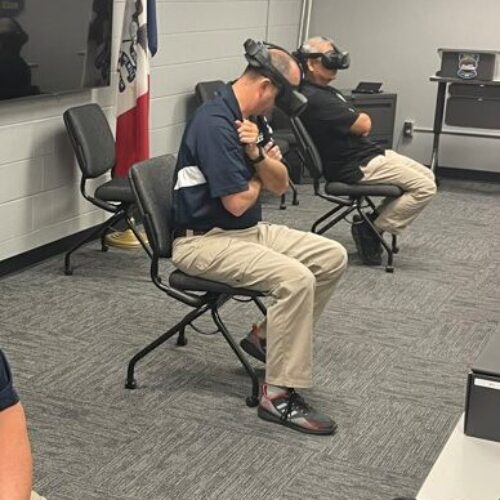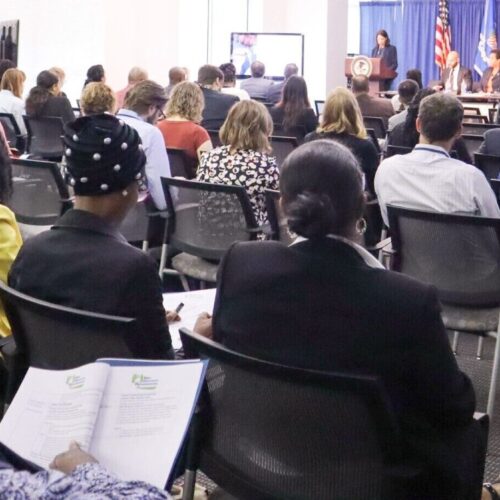Improving Outcomes for People in Contact with the Criminal Justice System Who Have Intellectual or Developmental Disabilities
Improving Outcomes for People in Contact with the Criminal Justice System Who Have Intellectual or Developmental Disabilities
When people with intellectual or developmental disabilities (IDD) encounter or are involved in the criminal justice system, they often experience a system that is unable to address their unique needs and face misconceptions about their abilities. However, there are ways to help improve outcomes for people with IDD and reduce their chances of re-encountering the criminal justice system. This brief offers important steps that criminal justice administrators can take to better identify and respond to the needs of people with IDD. Photo credit: Photo by Christina Morillo
Improving Outcomes for People in Contact with the Criminal Justice System Who Have Intellectual or Developmental Disabilities
Historically, people with intellectual or developmental disabilities (IDD)—such as Down syndrome or autism spectrum disorder1—have been both under and poorly served2 in their communities. Jurisdictions often lack programs tailored to address the unique needs of people with IDD, as well as care providers who are trained to provide treatment. Similarly, when people with IDD encounter or are involved in the criminal justice system, they often experience a system that is unable to address their unique needs3 and face misconceptions about their abilities.
However, there are ways to help improve outcomes for people with IDD and reduce their chances of re-encountering the criminal justice system. This brief offers important steps that criminal justice administrators can take to better identify and respond to the needs of people with IDD.
1. Train all staff to identify people who have IDD.
Being able to quickly identify people who have IDD is not only imperative in providing appropriate supportive services, but it also aids in their ability to access the legal system and understand the judicial process. Additionally, this identification is a necessary part of complying with the Americans with Disabilities Act (ADA), which protects individuals with IDD from discrimination within the criminal justice system, in addition to other provisions.4 Therefore, professionals across the criminal justice system, from dispatch to reentry, should regularly receive training on ways to identify if someone has an IDD, how to meet ADA compliance measures, and any updated policies.
For example, officers and other first responders who make initial contact should be trained to properly ask questions that can help them identify if a person has an IDD. Potential questions can include the following:
• Do you get any money from the government or social services, such as Supplemental Security Income (SSI) or Medicaid?
• Have you ever attended special education classes?
• What is something you are good at? What is something you need help with or struggle doing?
• You may need to fill out some forms today. Do you need help with this? How can I help you? Is there any other assistance you need?
• When you need to make decisions, does anyone help you, such as a legal guardian? Is there someone I should call to
help you right now?5
Staff should also be trained to observe whether the person is having difficulty understanding, responding, or communicating while answering any of these questions and if they need more time to respond. One way to confirm understanding is by asking individuals to repeat what is being said in their own words.
2. Create policies for engaging with and responding to people with IDD.
When criminal justice system staff encounter a person who may have an IDD, they should have policies in place that inform proper interaction. IDD policies should include: (1) language on de-escalation;6 (2) information about use of person-centered and inclusive language;7 and (3) guidance on appropriately accommodating, interacting, and communicating with people with IDD. For example, policies should indicate that screenings do not occur in open areas, which can often be loud and distracting for people with IDD and could make it more challenging for them to answer questions. Open area screenings also risk public disclosure of a disability, which can lead to increased stigmatization and risk of victimization. Criminal justice administrators should ensure these policies are regularly updated and informed by program evaluation and disseminated to all staff in a clear manner.
3. Develop collaborations with advocates, experts on IDD, and people with lived experience in the criminal justice system.
Criminal justice administrators cannot effectively respond to the needs of people with IDD alone, so it is important to build and maintain cross systems collaborations that dismantle silos. Partnering with stakeholders, comprised of individuals from the IDD community, can help criminal justice administrators better understand the needs of people with IDD and increase their access to services. One way to establish these partnerships is by collaborating with a local chapter of The Arc—the largest community-based organization in the U.S. advocating with and for people with IDD—to create or join a Disability Response Team. Criminal justice administrators can also establish referral agreements with local programs and service providers.
4. Conduct more research on the needs of people with IDD.
Criminal justice administrators should invest in more research on the needs of people with IDD in the criminal justice system. Currently, research on the subject is limited. Not only would this help administrators create and enhance programs that address the unique needs for people with IDD, but research also could lead to more funding for sustainable programs to help improve outcomes for this population.
IDD Screening Tools
If responses and/or observations to initial questions suggest that the person may have a disability, then staff trained on IDD should conduct a further screen.8 Below are three validated IDD screening tools:
Hayes Ability Screening Index-Nonverbal
This index is a brief, individually administered screening tool used to identify people who may have intellectual disabilities whether they are victims, witnesses, or suspected of committing a crime. It can be administered by non-mental health professionals within 5-10 minutes and includes both self-report questions and performance-based tasks.
Learning Disability Screening Questionnaire
This questionnaire is a brief screening tool used to identify people over the age of 16 who may have intellectual disabilities. It can be completed directly by the person being screened or by another person who knows the individual well. It has been used in both clinical and criminal justice settings, including in probation, prison, and police departments.9
Rapid Assessment of Potential Intellectual Disability (RAPID)
This screening tool provides a simple and easy measurement to identify people who may have intellectual disabilities so that they may be referred for further assessment to confirm the diagnosis. It includes a total of 15 questions which are asked in a structured interview and takes about 3-5 minutes to administer.
Endnotes
1. “About Intellectual and Developmental Disabilities,” U.S. Department of Health and Human Services and National Institutes of Health, accessed March 22, 2022, https://www.nichd.nih.gov/health/topics/idds/conditioninfo. 2. “Dehumanization, Discrimination, and Segregation,” Disability Justice, accessed March 22, 2022, https://disabilityjustice.org/justice-denied/dehumanization-discrimination-and-segregation/. 3. Leigh Ann Davis, People with Intellectual Disabilities in the Criminal Justice Systems: Victims and Suspects (Washington, DC: The Arc, 2009), https://thearc.org/wp-content/uploads/forchapters/Criminal%20Justice%20System.pdf. 4. “Examples and Resources to Support Criminal Justice Entities in Compliance with Title II of the Americans with Disabilities Act,” U.S. Department of Justice Civil Rights Division, accessed March 29, 2022, https://www.ada.gov/cjta.html. 5. “IDD Screening,” Centre for Addiction and Mental Health, accessed March 22, 2022, https://www.camh.ca/en/professionals/treating-conditions-and-disorders/intellectual-and-developmental-disabilities/idd—screening. 6. The International Association of Chiefs of Police (IACP) has a policy on interacting with people with IDD. See “Interactions with Individuals with Intellectual and Developmental Disabilities,” IACP, accessed March 22, 2022, https://www.theiacp.org/resources/policy-center-resource/intellectual-and-developmental-disabilities. 7. Amy C. Watson, Michael T. Compton, and Leah G. Pope, Crisis Response Services for People with Mental Illnesses or Intellectual and Developmental Disabilities: A Review of the Literature on Police-based and Other First Response Models (New York: Vera Institute of Justice, 2019), https://www.vera.org/downloads/publications/crisis-response-services-for-people-with-mental-illnesses-or-intellectual-and-developmental-disabilities.pdf. 8. Please note that a screening is not an assessment. A full assessment is needed to determine an official diagnosis of IDD. 9. AL Murray, T Booth, and K McKenzie, “An Analysis of Differential Item Functioning by Gender in the Learning Disability Screening Questionnaire (LDSQ),” Research in Developmental Disabilities 39 (2015): 76–82, https://doi.org/10.1016/j.ridd.2014.12.006
Dig Deeper
The Council of State Governments Justice Center offers free in-depth subject matter expertise and can connect you to programs and agencies that have established screening and other policies to improve outcomes of people with IDD. Visit the Center for Justice and Mental Health Partnerships to learn more.
Additional Resources
The Police-Mental Health Collaboration toolkit provides resources for law enforcement agencies to partner with service providers, advocates, and individuals with mental health disabilities or IDD.
The Bureau of Justice Assistance (BJA) is supporting the development of “Crisis Response and Intervention Training,” which trains police officers on IDD-specific response considerations and community resources.
Project Credits
Writing: Jazmone Wilkerson and Felicia Lopez-Wright, CSG Justice Center and Leigh Ann Davis, The Arc
Research: Jazmone Wilkerson and Felicia Lopez-Wright, CSG Justice Center and Leigh Ann Davis, The Arc
Advising: Demetrius Thomas, CSG Justice Center
Editing: Darby Baham, CSG Justice Center
Design: Michael Bierman
Public Affairs: Ruvi Lopez, CSG Justice Center
Web Development: Catherine Allary
This project was supported by Grant No. 2019-MO-BX-K001 awarded by the Bureau of Justice Assistance. The Bureau of Justice Assistance is a component of the Department of Justice’s Office of Justice Programs, which also includes the Bureau of Justice Statistics, the National Institute of Justice, the Office of Juvenile Justice and Delinquency Prevention, the Office for Victims of Crime, and the SMART Office. Points of view or opinions in this document are those of the author and do not necessarily represent the official position or policies of the U.S. Department of Justice.
About the authors


********This application deadline has passed******** With support from the U.S. Department of Justice’s Office of…
Read MoreUnlike drug courts, which have been informed by national standards for 10 years, mental health courts (MHCs)…
Read More Building a Better Mental Health Court: New Hampshire Judicial Branch Establishes State Guidelines
Read More
Building a Better Mental Health Court: New Hampshire Judicial Branch Establishes State Guidelines
Read More
 Apply Now to Join a Community of Practice on Police-Mental Health Collaboration Staff Wellness
Apply Now to Join a Community of Practice on Police-Mental Health Collaboration Staff Wellness
With support from the U.S. Department of Justice’s Office of Justice Programs’…
Read More
















